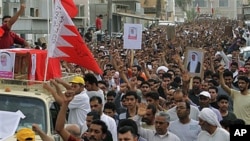As uprisings continue in the Arab world, one Persian Gulf country - Bahrain - has seen protests demanding greater political freedoms. Bahraini authorities have used deadly force, and have reportedly rounded up and detained a number of opposition activists. Recently, Bahrain's finance minister came to Washington, where he presented his views on the situation.
Thousands of Bahrainis took to the streets beginning in mid-February, demanding reforms to make the kingdom's government and economy more inclusive for all citizens.
Then, on March 14, the Gulf Cooperation Council, led by Saudi Arabia, rolled a military force into Manama at the invitation of the al-Khalifas, Bahrain's ruling family.
On April 19, Bahrain's finance minister, Sheikh Ahmed al-Khalifa, spoke in Washington about the actions of his government. His perceptions of the situation are markedly different from those that emerge from news coverage, human rights groups, and third-party analysis.
Bahrain is overwhelmingly Shi'ite, but the al-Khalifa family is Sunni, as is some 30 percent of Bahrain's population. Yet the Sunni control Bahrain’s political and economic power.
To Sheikh Ahmed, though, that disparity between the two groups does not exist. "I don't see huge differences between Sunnis and Shi'as. The rights are there for every citizen of Bahrain. They have always been," he said.
Human Rights Watch official Joe Stork says his observations in Bahrain are very different. "The discrimination that Shi'a perceive - in terms of access to jobs, access to a share of the country's wealth, and so forth. When you overlay that with the basic, you know, the complete absence of any kind of power sharing [between Sunni and Shi'a], that's really what this [the protests] is all about," he said.
Bahrain's Shi'ites have been accused by the al-Khalifas, and by other Sunni Persian Gulf royal families, of being under the influence of Iran.
Sheikh Ahmed says the recent protests are an attempt by Tehran to destabilize Bahrain's government. "In terms of Iran, you have seen their announcements [statements]. We feel that what happens in Bahrain is for the Bahraini people to reach consensus on, and to resolve. And, Iran is our neighbor, but we think that what has happened has to be resolved within Bahrain," he said.
Foreign Policy Magazine writer and Georgetown University professor Jean Francois Seznec, however, says the Iran accusations are inflated.
"The public relations offices of the al-Khalifas, right now in Washington, as we speak, are distributing all manners of information saying that Iran was behind all of this [the turmoil in Bahrain]. And, that this a conspiracy that has been going on for 20 - 30 years. The fact is, my own experience, anyway, tells me that the Shi'a feel Bahraini. They don't feel Iranian. They don't really like Iran," he said.
Sheikh Ahmed said the government told the opposition it would engage in talks, as long as people came to the table without preconditions. The protesters refused. The Bahraini minister says the opposition is unwilling to work for a constructive solution. "This path was not used. What was used was an attempt to hijack this political process by forcing one way of thinking, which we believe was not the right way for Bahrain," he said.
But an independent organization, the International Crisis Group, recently issued a report on Bahrain's turmoil. ICG's Joost Hilterman says the opposition's preconditions for talks were demands for safety and justice. "The opposition wanted the security forces to allow peaceful protests in Manama and other areas of Bahrain. And, they wanted those who fired on demonstrators in the past to be held accountable," he said.
Along with firing on protesters, causing deaths and many injuries, Bahrain's security forces have also jailed a number of people. Sheikh Ahmed sees them as criminals. "The people who have been detained are people who have committed crimes. Not the people who have stated an opinion. A very critical point," he said.
Rights organizations dispute Sheikh Ahmed's "criminal" contention. They say arrests and jailings are being done to intimidate.
Joe Stork, of Human Rights Watch, said "Since April 2nd, we have had four people who were taken into custody five, six, seven days earlier. No contact with their families, no contact with lawyers. Next thing the family hears, they get a call from the Ministry of Interior saying 'come pick up the body.'"
Bahrain’s protesters have called for the creation of a constitutional monarchy, such as the British system, as a way of limiting the powers of the al-Khalifa family. But analysts say the al-Khalifas are strongly against any such change.





